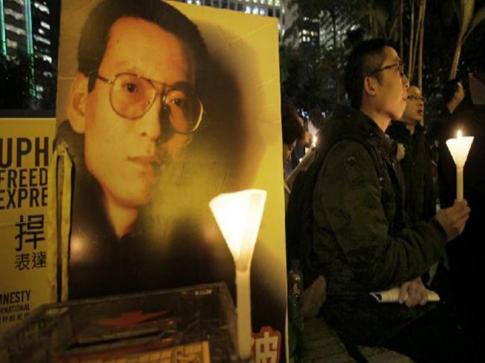Nobel Peace Prize: Liu Xiaobo's missing speech

A lost speech by Liu Xiaobo that has never never previously been published in the West has been unearth in which he attacks China's rise to power and the country's moral and cultural bankruptcy.
By Malcolm Moore, Shanghai
In it he compares modern China to T.S.Eliot's The Waste Land and says: "A nation, ignoring its youth and children, can build all the skyscrapers it wants, but in fact is only using its cloud-capped rise to decorate hell.".
The speech, given two years ago when he was awarded the Contemporary Chinese Contribution award, has only ever been released once, in an illegal Chinese magazine, and a copy was provided exclusively to The Daily Telegraph.
He gave it just six months before releasing Charter '08, a petition initially signed by 350 Chinese intellectuals calling for measured political reform in China. Mr Liu was arrested hours before Charter '08 was released on to the internet and is now serving an eleven year sentence for "inciting subversion".
Mr Liu said in the speech that imprisonment, or harassment by the authorities, would not dent his determination to speak freely.
"[The fact I am] closely monitored by the police for the past 19 years poses no challenge to my courage. When a government resorts to using its state security apparatus against a defenceless intellectual, it only means the regime has long been rotten at its core and its violence is only an expression of its waning power," he said.
He also attacked those who have accepted the grand bargain struck by China's leaders, to provide wealth in exchange for political support, saying that the "people immersed in the pursuit of wealth or intoxicated by the happiness of a comfortable life" are merely taking part in a "fabricated carnival".
The power of Mr Liu's pen, and the elegance and clarity of his writing, has grated against the nerve endings of the Chinese government, which has still not lost its taste for leaden propaganda.
"I do not feel shame because of the chorus of party mouthpieces singing praise and glory continuously. When the role of the government becomes to sing its infinite praises or to brag about its greatness, the main melody has long become a joke for the folk songs of the people and can only sound the falling dusk of a dictatorship," Mr Liu said.
Mr Liu's career has been marked by his unsparing, if occasionally outspoken, honesty, and he also attacked the indifference within Chinese society, the "cynicism" of its intellectuals, and the cowardice of those Chinese who have fled outside the country. "When those who remained silent for years in terror raise their voices to a high pitch when they leave the country, it is only the act of a clown after his safety has been guaranteed".
However, the speech also reveals Mr Liu's inner turmoil, and a "profound sadness" and a deep "shame" about his own writing, which he compared to "wild grass" growing on China's waste land.
"The decadence conveyed in Eliot's Waste Land is like an elegy of our modern civilisation," he said.
"Looking back, I find my writing imprinted with the stamp of growing up in a cultural desert, marked by fragments left over from the Cultural Revolution," he said. "Many of my essays are as transient as the clouds and cannot escape the fate of being swept into a rubbish bin one day," he added.
Since the Tiananmen Square protests in 1989, Mr Liu said he had tried to "fight and live with dignity" but that he was unable to escape a sense of "living in shame, under the eye of heaven". However, he promised to redouble his efforts with his writing "so as to bear no shame to the tragic poem that the dead of June 4 (the date of the Tiananmen Square massacre) composed with their lives".




 del.icio.us
del.icio.us Digg
Digg

Post your comment